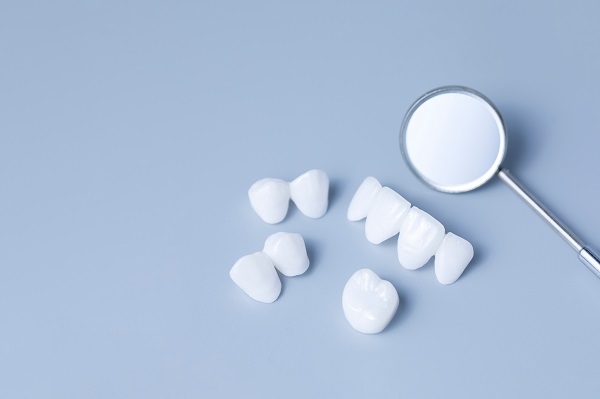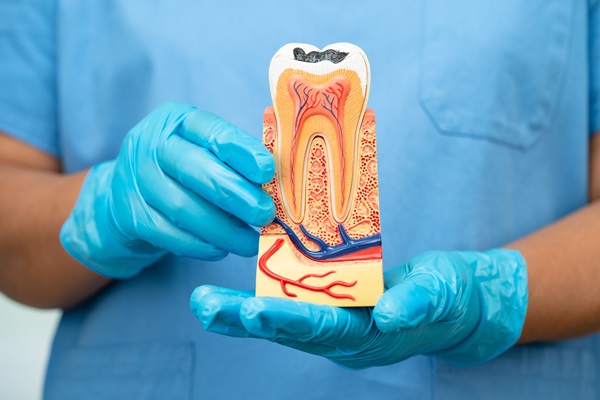How a Dental Crown Is Used for a Damaged Tooth

A dental crown is a device used to restore the functions and look of a tooth that has been damaged. If you need a root canal, a fractured tooth, or a big filling, your dentist may also decide to place a dental crown. The new crown covers the part of the tooth visible above the gums.
How is a dental crown used to restore a damaged tooth?
Dental crowns are permanently bonded to teeth that are severely decayed, fractured, or damaged. They cover the whole region of the natural tooth's crown that is above the gum line. Dental crowns are created to fit the patient's tooth and can be composed of various materials, including porcelain, composite resin, and gold.
Dentists use crowns for various purposes. They can prevent a cracked tooth from additional deterioration, strengthen a weak tooth, support a tooth with big fillings, and restore the form of a damaged tooth. The crown is a restoration that supports and replaces the tooth structure that has been damaged. When a crown is bonded to a broken tooth, it effectively becomes a part of the tooth and helps to keep it together.
A dentist usually recommends crowns to restore the function, form, look, and alignment of a damaged tooth. It is the only visible part of the tooth once it is in position. They are designed to blend in with the rest of the teeth and are usually undetectable. Crowns are made of strong and long-lasting materials so they can withstand the pressure of chewing and biting.
The dental crown placement
The soft tissues around the tooth that will receive the dental crown will be numbed with a local anesthetic by the dentist. They will remove a portion of the tooth enamel on both sides with a dental drill to make room for the new crown. If a portion of the present tooth's structure is missing, the dentist may fill up the gaps to provide a solid foundation for the dental crown. Following that, the dentist will take imprints of the teeth and send them to a dental lab, which will manufacture the crown.
After receiving the patient's tooth impressions, the dental lab will construct the crown in around two weeks. The dentist will offer a temporary crown to safeguard the tooth while it is being made. When the permanent crown is ready, a second appointment will be required. Next, the dentist will remove the temporary crown and fit the new one properly to the tooth and bite.
When the dentist is happy with the tooth's alignment, dental cement will firmly attach the crown to the tooth. The cement drying process ensures that the crown is securely attached.
The bottom line
If you currently have a tooth that is damaged, cracked, or decayed, it is a good idea to schedule a consultation appointment with a dentist as soon as possible. They will assess your situation and recommend the appropriate treatment.
Request an appointment here: https://beautifulmouth.com or call Beautiful Smile, LLC at (856) 346-8900 for an appointment in our Gibbsboro office
Check out what others are saying about our dental services on Yelp: Dental Crowns and Dental Bridges in Gibbsboro, NJ.
Recent Posts
Patients considering dental crowns may have concerns regarding the recovery period following the procedure. Fortunately, the typical recovery period is relatively quick and involves minor inconvenience. Most risks and complications resulting from the procedure are comparable to those of most dental procedures and therefore require similar precautions.The placement of dental crowns involves two stages, each…
Dental crowns are among the most common types of restorative treatments dentists provide. A crown has many uses and benefits. Not only can it restore the aesthetics of your smile, but it relieves pain, protects a damaged tooth, and prevents further problems from occurring to weak teeth. The process of getting a crown can require…
A dental crown is one of the most common ways to have a tooth restored. However, patients may want to know why the process of restoration is needed. It is a good question that can easily be answered.Outlined below are a few times when a dental crown is necessary. Dental crown placement will not only address…
Understanding the reasons for dental crowns allows those in need of restoration treatment to know if this treatment is the right option for them. Asking a general dentist about dental crowns allows individuals to get the detailed information they need, as general dentists perform restoration services on a daily basis, thus making them experts on…


